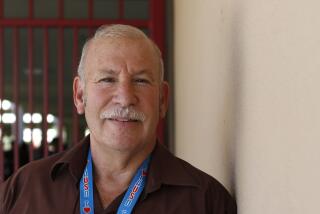After 2 contested elections, L.A. Community College District may finally have a tech fix
Job description: Long meetings at least once a month. Dull workload, unless ratifying software agreements is your idea of fun. When important personnel and financial decisions are on the table, your opinion doesn’t really count. The pay for your trouble is $500 a month.
Being the student trustee for the Los Angeles Community College District sounds awesome, right?
It does to Milo Anderson and Ryan Navarrete. The two men have been fighting over the student seat on the eight-member board of trustees since last summer. Their months-long feud has featured accusations of unsavory campaign tactics and fraudulent votes.
The fight may seem high schoolish, but it underscores a technology problem at the largest community college district in the nation. Instead of using machines to tally paper ballots, district officials counted them by hand. And instead of employing safeguards to make sure students voted only once, an audit revealed that up to six people voted twice.
Elections for the other seven seats on the board of trustees are overseen by the Los Angeles city clerk. Those trustees serve four-year terms.
But a new student trustee is selected once a year. That’s too often for city officials to handle.
The nine schools in the Los Angeles Community College District aren’t the only two-year schools using primitive voting methods. Students at Glendale Community College and El Camino College in Torrance use paper ballots, which are counted by hand.
Until now, the low-tech approach hasn’t been a problem. But the race between Anderson and Navarrete was unusually close — and now the controversy surrounding the outcome is unprecedented, observers say.
“We’ve never had anything like this,” said Adriana Barrera, a deputy chancellor who helps oversee student elections.
The saga began nearly a year ago, in April. Navarrete, who is enrolled at East Los Angeles College and Los Angeles Trade Tech, won the initial contest by a mere three votes out of 4,143 total ballots cast. (Nearly 100,000 students were eligible to vote.)
But before Navarrete could be seated, Anderson, who attends Pierce College, contested the results. He alleged that voting booths weren’t open for the required amount of time each day and that some students cast multiple ballots.
To vote in the election, students had to present a valid form of identification before they could vote at campus polling places. Once the identity of students was verified, their names were marked off a list. But district officials did not compare those rolls to see if the vote total matched the number of students who checked in.
After an audit, district officials discovered that a handful of students may have voted more than once since the number of ballots cast was greater than the number of voters who checked into polling places. The only fair remedy was to hold another election, said system Chancellor Francisco Rodriguez.
“It looked like six people voted twice, but that could have been enough” to change the results of the election, he said.
In the meantime, the district appointed a temporary student trustee from East Los Angeles College, Gerson Liahut-Sanchez.
At first, Navarrete and Anderson seemed cordial, complimenting each other on Facebook even as they campaigned against each other in the do-over election.
“Well done, Ryan,” Anderson posted in July, after Navarrete discussed the importance of education and pride at a trustee meeting.
“Thank you Milo,” replied Navarrete, who hopes to become an attorney and perhaps run for office in the future.
But the civilities soon ended. First, Navarrete’s girlfriend, Tierra Gipson, accused Anderson of staring at her during a student debate. Navarrete asked his opponent to apologize for “objectifying” Gipson. “He was extremely disrespectful in a public forum and I wanted him to address that,” Navarrete said.
Anderson denied acting inappropriately but apologized anyway, telling Gipson on Facebook he was sorry if he ever made her feel he had “anything but respect” for her.
Then it was Anderson’s turn to go on the offensive. He accused Navarrete of using a misleading campaign slogan by contending he was running for “reelection.”
Navarrete said the claim was accurate since he got the most votes in the first election.
Navarrete charged that Anderson stole some of his ideas and tried to pass them off as his own, including a proposal to offer transit passes to students at steeply reduced prices. “He never talked about transportation until I did,” Navarrete said.
The second election was held in September, though only 879 students voted. Anderson won by 45 votes. He was sworn in on Nov. 4, with less than half his term remaining.
But Navarrete filed a petition in December asking for another election. He said the results of the second contest were skewed because some students wrote in Liahut-Sanchez, even though he was not an eligible candidate.
District officials said they have responded to the petition, although they declined to say what they decided.
In January, district trustees agreed to spend nearly $25,000 on a one-year contract with Votenet, a Washington, D.C., company that makes electronic voting systems. Students will have to enter their district-issued identification number before they cast a ballot on a computer, much the same way that they register for classes, Rodriguez said. That way, they can vote only once.
“We think this will solve all of the issues,” he said.
The system will be in place for the next student election in late April.
Navarrete said he hasn’t given up his dream of becoming a student trustee.
“I still think I’m the right man for the job,” he said.
Twitter: @byjsong
More to Read
Start your day right
Sign up for Essential California for news, features and recommendations from the L.A. Times and beyond in your inbox six days a week.
You may occasionally receive promotional content from the Los Angeles Times.







